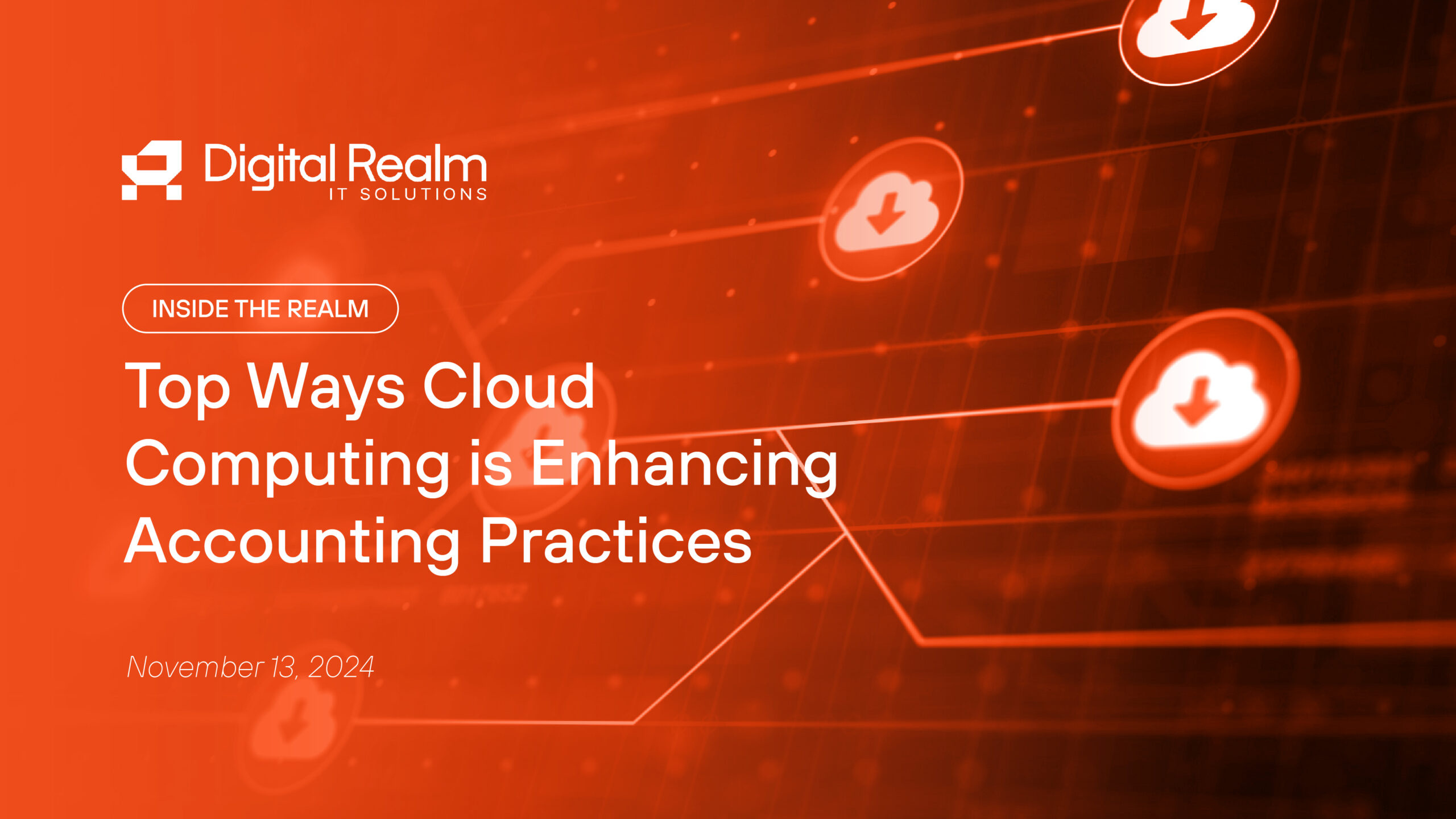Top Ways Cloud Computing is Enhancing Accounting Practices
During the pandemic and the post-pandemic eras, we have seen the rise in demand for virtual jobs, and witnessed how remote work setups have become more widely accepted by different industries. At a time where limited travel and in-person social interactions were allowed, organizations were forced to shift to a new work dynamic to keep the economy and their own businesses afloat. We saw how rapidly we had to transition to having work, products, and services delivered online.
As businesses adapted to the new normal, we also saw a rise in demand for virtual business solutions. Among these solutions are cloud computing services.

Cloud computing is the on-demand delivery of computing services such as servers, storage, and software over the internet. One can imagine it like a powerful computer and storage space that is readily accessible online. We more commonly know this space as “the cloud.” Cloud computing allows us to store data and run applications remotely which makes it the perfect setup for working virtually. This is why as the demand for remote work continues to grow, so does the demand for cloud computing services.
Cloud computing provides us with more than just the ability to work anytime and anywhere. It has also helped organizations across various industries get closer to operational excellence. This includes the accounting industry.
In this article, we will explore how this shift in paradigm has not only helped us gain better ease of access to data at critical times, but also how this technology has helped improved accounting practices.

Top four ways cloud computing has helped the accounting industry progress
Leaner Accounting Processes
With cloud computing, information is stored on remote servers that can be easily accessed online. This technology’s main feature, although seemingly so simple, is what helps reduce wasteful steps and protocols within operational processes. This reduction in waste adheres to the principle of Lean Six Sigma which combines reducing defects and errors with increasing quality and efficiency.
One main benefit of having information stored in the cloud is it gets updated in real-time. This allows stakeholders accessing the information to respond quickly once they see changes that need immediate action or correction. Information that always has the most up-to-date data makes it the single source of truth for the stakeholders accessing it. This attribute helps in minimizing the time employees have to spend going back and forth with their colleagues to confirm if they have the latest data. Not only does this increase efficiency, but it also promotes accuracy in record-keeping and reliability in financial reporting.

Another solution that cloud computing services offer to firms is the availability of automation options. Firms can streamline their processes by automating routine tasks such as data entry, invoicing, and bank reconciliation among others. You can also configure your setup to allow clients to generate reports on their own, further freeing up your accountants’ time from administrative workload. Cloud computing automations can also offer the ability to flag discrepancies and anomalies to help with filtering errors that could have been easily overlooked otherwise.
With the capabilities to automate tasks and produce real-time insights, accountants can shift their focus from administrative work to strategizing, improving processes, and providing excellent client service. This shift in focus increases efficiency while enhancing the overall value of the services your firm offers your clients.
Improved Collaboration and Communication
Another major feature of cloud computing is it enables multiple people to work on the same data at the same time, regardless of where they are physically. This is not only helpful for individuals working remotely; it is also a great tool for anyone who needs to consistently work with a team of people. This feature ensures that the team working on the data is consistently aligned, minimizing potential bottlenecks during the collaborative efforts.
Data and files created and stored in the cloud usually have features such as comments, notifications, and version controls that help with tracking updates. These features aid in avoiding potential miscommunications while promoting transparency within the workplace. You can also configure the recording of audit trails to encourage accountability within the team.

To strengthen client trust, firms can grant relevant stakeholders with appropriate access to certain information so they can easily check how their financial data is being managed by your firm. This showcases your firm’s trustworthiness and sense of responsibility.
Use of cloud computing services can also help managers become more proactive in responding to potential issues. With the use of online dashboards that can highlight key financial and performance metrics, managers can visualize financial data such as cash flows, expenses, and revenue trends. Proactive management encourages creativity and active collaboration within teams.
Smart Cost Savings
Moving to the cloud is a great way for firms to be smarter with their capitals and investments. Most cloud computing services operate on a subscription or pay-as-you-go basis; payment models that get rid of the need for large upfront investments. Maintaining on-premises infrastructures such as physical servers is one of the most expensive aspects of starting a business in the modern world. The costs associated with such an investment, in addition to the costs of maintaining the infrastructure are significantly reduced by migrating to the cloud. With this lower barrier of entry, cloud computing is certainly more accessible for smaller businesses, firms with limited budgets, as well as firms looking to improve cash flow.

The way most cloud computing services are designed allows for flexibility in resource management. This way, firms have more freedom to scale their availed subscriptions and services based on what they currently need. Firms are able to experiment on areas they wish to develop without being limited by physical resource restrictions.
Another financial benefit of switching to cloud computing is how it minimizes the expenses that go to in-house IT support, allowing firms to allocate their resources better by focusing on other business needs. Instead of dedicating resources to maintaining on-prem infrastructures, firms can simply partner with a reliable IT partner to oversee their organization’s cloud services. This is a much more cost-effective option with the benefit of guaranteed continuous support.
Enhanced Data Security
Some firms may have reservations about putting their data and information to the cloud because of the misconception that it is less secure than on-prem infrastructures. The reality is cloud computing offers a wide range of security features that safeguard private information and financial data online.
With secure cloud computing, data is encrypted, making it unreadable to unauthorized users. You can also configure your data to include access controls so that only approved stakeholders can view or modify the information.
Cloud computing service providers are also bound by laws to follow strict privacy regulations. The stringent security protocols that are in place to protect sensitive information can put firms at ease that their information’s confidentiality and privacy are maintained. Having these protocols inherently designed within secure cloud computing services is also a great aid for firms who are also working on meeting certain regulatory requirements

We have discussed automation in the earlier section of this article. Another useful security feature that is available through cloud computing is the ability to back up data automatically on a regular basis. Working with digital data comes the risk of data loss. From accidental deletion to system failures, and even cyberattacks, there are several factors that may result to losing important data. If your firm has regular automated backups, you can reduce this risk. Most cloud services can quickly restore lost data, minimizing operational downtime and disruption.
Every organization should have a business continuity plan (BCP) in place. Shifting to the use of cloud computing services is a great addition to any BCP.
Cloud computing, inherently, approaches data security with proactiveness. Not only can you be assured that your firm’s data is protected, but you can also reinforce your clients’ trust in your secured services.
Technological advancements in response to what the world needs are truly incredible, especially when taking into account how quickly both the technology and the humans who use it can quickly adapt to the changes.
Having reservations towards change is normal, but embracing a technology that has been proven useful throughout the years is a sure step towards growth. For accounting firms, implementing cloud computing services empowers you to gain competitive advantage against other firms. Showcase how your firm does not only adapt to but leverages modern and efficient solutions such as cloud computing.
Cloud computing services can help your firm streamline your operations and processes, encourage your team’s collaboration, improve your relationship with your clients, assist in better resource allocation, and enhance your firm’s data security protocols. Integration of cloud computing services in accounting operations will significantly help your firm stay agile, secured, and prepared for scaling.
Be open to the possibilities brought about by cloud computing. If you are interested in transforming your firm with cloud solutions, contact us today to learn how we can be your trusted IT partner in your cloud journey.




